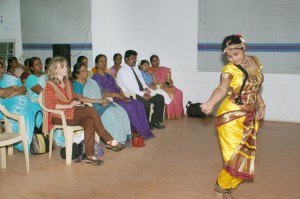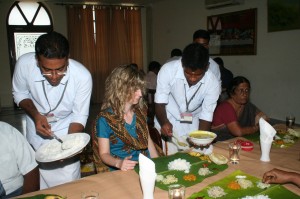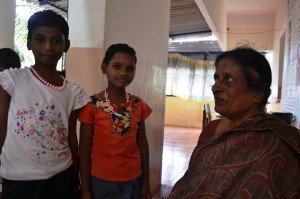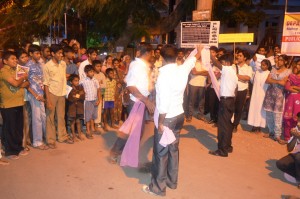The third in Kami L. Rice’s guest series on visiting India.

Last week I eagerly ventured further south to Coimbatore, where I was greeted with flowers and smiles at the airport by my hosts-for-the-week from CSI Bishop Appasamy College of Arts & Sciences (BACAS), a Church of South India (CSI) college founded in 1995. I’m connected to BACAS via my freelance work, and when I met Mrs. Susheila Williams, the college’s Secretary (which in India is the title for the chief administrative leader, a role something like that of a college president), at a conference in the U.S. last year, she warmly invited me to visit the college when I came to India.
BACAS is an international affiliate member of the Council for Christian Colleges & Universities (CCCU). Beginning in September, BACAS will host the CCCU’s new BestSemester India Studies Program. I’ve covered articles about the new program as well as about BACAS, so even before my visit I was fairly well aware of how much the college does to reach out to its community, but I learned much more and saw first-hand what that looks like while I visited.
Students at BACAS aren’t required to be Christians, but the college offers a student-led weekly chapel service, retreats for Christians that non-Christian students are welcome to attend, and a clear Christian testimony that permeates the college. Several scenes from my visit will stay with me for a very long time, but I’ll share just a couple here.

My first day on campus included visits to many of the academic departments to meet faculty and be given an overview of their programs. The English department also gathered 20 or so students for me to meet and chat with briefly. As we were leaving this gathering, the department chair wanted me to meet one particular student who was seated at the back of the room. She introduced me to Aishwarya (who goes by Rya), who smiled prettily from her seat while several of her fellow students gathered around her in a friendly but attentive manner. I wondered why they were all hovering. Is she the popular girl or something? Was there something they all needed to tell her?
After we left the classroom, the department chair explained to me that Rya has muscular dystrophy and is one of the physically disabled students to whom the college gives a 50 percent reduction in tuition. Both Rya and a sibling have the degenerative disease, and their father has left their family, perhaps because the responsibility and prognosis of their care was too much for him.
Other students help Rya move from class to class and help her with the stairs when the elevator isn’t working (which is the case when the electricity is out). So that’s why they were hovering. No motorized scooters here for helping with mobility.
The college fosters this spirit of students helping students in other ways too. For example, when students paying reduced tuition still struggle to cover the remainder of their fees, fellow students (and faculty, too) often make contributions to help them.

Later that same day I accompanied Mrs. Williams and a faculty member from the social work department to a depressed area outside Coimbatore, where the college helps pay tutors to run what is referred to as a dropout center. Young students in this community have had to move often, putting them behind in school, and causing them to be in great danger of dropping out completely. The extra tutoring and other investments by the college, such as digging a well in the community, help the students stay in school and go on to college.
For the rest of the week, Mrs. Williams couldn’t stop celebrating the visible physical changes in a community that used to qualify as a slum. I think it had been a little while since she had been there in person, and she later told me it was one of the best days of her life seeing the fruit of the hard work there. More than 20 students from the dropout center have now become college graduates, which is helping change their community.
Mrs. Williams also celebrated the significance of the way I was treated. While my outsider, American status and blond hair still created a stir and made me a bit of a celebrity, she noted that it was striking evidence of change that the children asked for my autograph and a handshake rather than asking me for money.
On my final day in Coimbatore, before my hosts took me to Chennai to visit some of India’s ancient heritage sites, I was asked to meet with a group of students I hadn’t previously heard about. By this point, I thought I knew about most of the college’s programs and the groups receiving fee concessions. But another group awaited me: also receiving reduced tuition at the college are Sri Lankan refugee students from refugee camps in Tamil Nadu, the state BACAS is located in, and other parts of India.

Working with the refugee community in Nashville and learning about the challenging conditions of many refugee camps around the world has created a soft spot in my heart for refugees, so I was excited to meet these students and excited that they are being given opportunities outside the camps. The student services staff person who facilitated our meeting told the students about the American students who will soon be arriving for the CCCU’s BestSemester India Studies Program. She exhorted them to take advantage of the opportunity this will give them to interact with students from another part of the world.
Her message reflected the college’s great excitement over hosting this program, in one part because of how it will expand the education of their Indian—and Sri Lankan—students. For students who can’t afford to study abroad, the college is bringing the abroad to them.
These are just a few examples of the ways the college is living out its faith in service to students and the community. Like faculty at many Christian colleges in the States, BACAS faculty could teach elsewhere and earn higher salaries, but they stay at BACAS because they are committed to the college’s vision and to the supportive campus community it fosters.
Based in Nashville, Tenn., Kami Rice (www.kamirice.com) became a fan of avocadoes in Kenya, olives in England and Italy, tilapia in Uganda, mangoes in Haiti and Indian chai in, well, India. Since 2007, she has worked full-time as a freelance writer. She also served briefly as a part-time member of InterVarsity’s Graduate & Faculty Ministries team. She’s also blogging from India at www.kami-in-africa.blogspot.com.

Leave a Reply